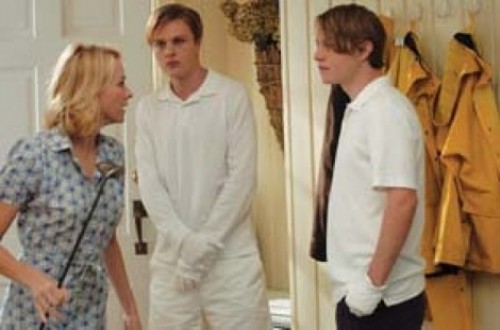Cinema | Repeat Offender: Michael Haneke remakes his own Funny Games'and it’s just as disturbing the second time around
By Scott Renshaw @scottrenshawThat’s an oversimplification, of course—but probably not by much. Many who saw the original were actively angered by it, but the film’s thematic targets seemed much more appropriate within the context of American pop culture. Cinema junkies familiar with Haneke’s original have already let loose a fusillade of “why bother,” insuring that even those usually in his artistic corner now have something to complain about as well. In a film landscape dominated by artists bent on ingratiating themselves, the guy makes an impression.
But the chilling 2008 model of Funny Games reminds us that Haneke succeeds at more than mere provocation. The premise is identical to that of its predecessor: Upscale couple George (Tim Roth) and Anna (Naomi Watts) are driving to their lakeside vacation home with their son Georgie (Devon Gearheart). Upon arriving, they notice their neighbors behaving strangely and soon receive a visit from two young men claiming to be guests of those neighbors. But Paul (Michael Pitt) and Peter (Brady Corbet), despite their clean-cut looks and white tennis clothes, aren’t particularly pleasant guests. And the games they have in mind for Anna, George and Georgie are considerably more brutal than tennis.
The basic plot mechanics aren’t the only thing that should be familiar to those who saw the 1997 version. Haneke isn’t the first foreign auteur to remake one of his own movies in English—George Sluizer did it with The Vanishing in 1993—but what’s remarkable about Funny Games v. 2.0 is that it’s practically a shot-for-shot, word-for-word reproduction of the original. The sets are the same; the credits are the same; the music cues are the same; even the oversize sweater worn by the female lead at one point appears to be the same. There’s something remarkably, almost refreshingly, arrogant about the gesture: Haneke is basically saying, “I nailed it the first time, so why mess around with superficial changes?”
And damn him, he’s right. Funny Games in both its incarnations delivers an assault on the entire idea of what we permit ourselves to find “entertaining,” by breaking down the buffers between media violence and its viewers. From the moment that Haneke dares to kill off a family pet—because nothing in American movies is more sacrosanct than the idea that the dog will survive—he begins to hammer at the expectations of his genre. His “villains” address the camera directly, taunting our helpless voyeurism; a moment of cathartic release suddenly turns into a sucker punch. Rarely has a film pushed an audience so hard to ask itself why the hell we’re watching in the first place.
But what’s remarkable about Funny Games is how masterfully Haneke manipulates emotions even as he’s reminding us repeatedly that he’s not playing fair. The dull, excruciating mechanics of mere survival—both physical and psychic—dominate a single sustained take that may last seven or eight minutes but feels infinitely longer. As a simple exercise in genre filmmaking, it’s terrifically tense, especially because there’s no way to anticipate where Haneke will go. He plays one of the most sadistic tricks you could imagine of an artist, because he repeatedly makes the horrifying ordeal of this family feel genuine, only to kick us in the teeth for our empathy.
For the purists, there’s a little to quibble over in terms of the relative merits of the new cast’s performances compared to their predecessors. Pitt and Corbet are both terrific as the unfailingly polite psychos, while Roth can’t quite match the doughy powerlessness of Ulrich Mühe. Watts has the toughest individual scene, but at times falls short of Susanne Lothar’s jelly-legged disbelief. The question remains, perhaps, as to whether there was really a point to photocopying a film where one of its most crucial qualities was its startling unpredictability. Haneke undoubtedly would have a particularly hearty chuckle over those who could be lured into this punishing experience a second time around, but perhaps he’ll settle for asking a new, unsuspecting audience, “Are you not entertained?”
FUNNY GAMES
Naomi Watts, Tim Roth, Michael Pitt
Rated R
More by Scott Renshaw
-
Film Reviews: New Releases for April 19
The Ministry of Ungentlemanly Warfare, Abigail, The Beast, Hard Miles, Sasquatch Sunset and more
- Apr 19, 2024
-
Faces of Salt Lake County book and portrait reception
Images and personal stories in a new book reveal local demographic diversity
- Apr 17, 2024
-
Feature film review: THE BEAST
A filmmaker's compelling ideas get a bit tangled in references to his creative influences.
- Apr 17, 2024
- More »
Latest in Film Reviews
Readers also liked…
-
Power Plays
Two satirical comedies explore manipulations and self-delusions by those with power.
- Aug 31, 2022





